-Robinson Jeffers (1887-1962)
One of my favorite environmental poets/authors is Robinson Jeffers. Most folks, when they think of environmental authors, automatically jump on the Thoreau bandwagon. Thoreau's nice, and all...but for my money....compared to the likes of Jeffers (whose words were, and are, razor sharp), and Aldo Leopold (who was an actual academic research-ecologist)....Thoreau was a chump. Doesn't mean I don't like his work. But in my mind, he just doesn't compare to some of the others, despite his popularity. Jeffers is not always lumped into the "environmental" poets, because his work is not only about the environment...and often includes social commentary and etc..
The Poem that I started above by Jeffers is called "The Bloody Sire". What immediately follows is:
"What but fear winged the birds, and hunger
jewelled with such eyes the great goshawk's head?
Violence has been the sire of all the world's values."
The rest of the poem also pulls no punches.
If you've never read Jeffers before, check him out! And, if you've never read Leopold....what the heck are you waiting for? :)
______________________________________________________________________
Anyways, this post is not meant to be commentary on Environmental Poets, Philosophers, or Authors. But the one of the subject's of the poem by Jeffers (the wolf), is really what I'm getting at.
Specifically surrounding a workshop that we are hosting at the university, allowing opportunities for students to learn anything and everything about wolves in the state: ecology, natural history, management, regulation, field survey techniques, and field ecology techniques. Basically, anything and everything I wanted to get to do as an undergrad! The workshop is part 1 of a course the students are enrolled in, where they learn about wolf ecology and management from professional wildlife biologists, learn to conduct track surveys with professional trackers, THEN get to spend a week doing wolf track surveys with DNR wolf biologists!
Who could ask for anything more?
So, meet Randy. Randy has been a professional state wolf biologist for over 30 years. He is largely responsible for instigating the wolf recovery program in the state....a program that has been amazingly successful.
Randy shared his knowledge of all things "wolfy" with the students.
This obviously involved skulls and pelts.
Informative lectures....
A demonstration of setting a proper "dirt-hole set" with a leg-hold trap....which is the most effective way to capture wolves for management or research-related purposes....
First you open the trap....
Then, conceal it carefully by burying it lightly in some dirt......
GOTCHA!!!!!.....
All in all, an outstanding (and incredibly information-packed) day.
Now, the students must wait until January for the next stage of the course (field work). Perhaps I'll have some pictures to share....although no promises.
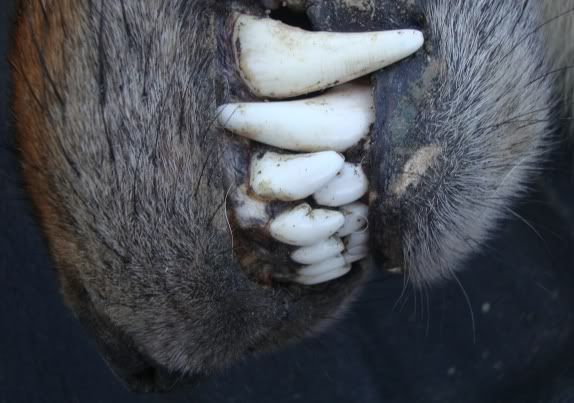
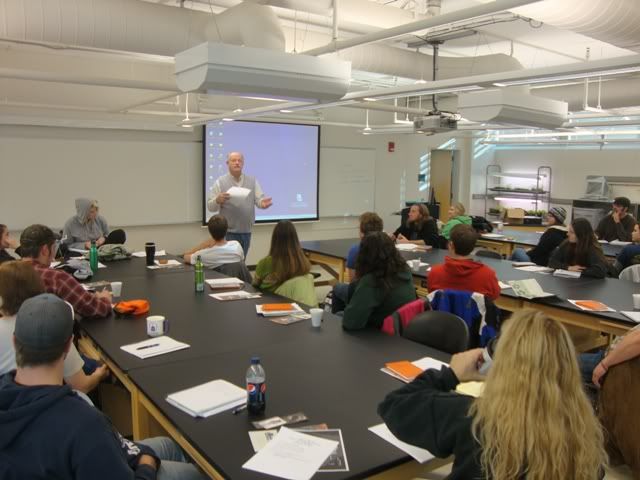

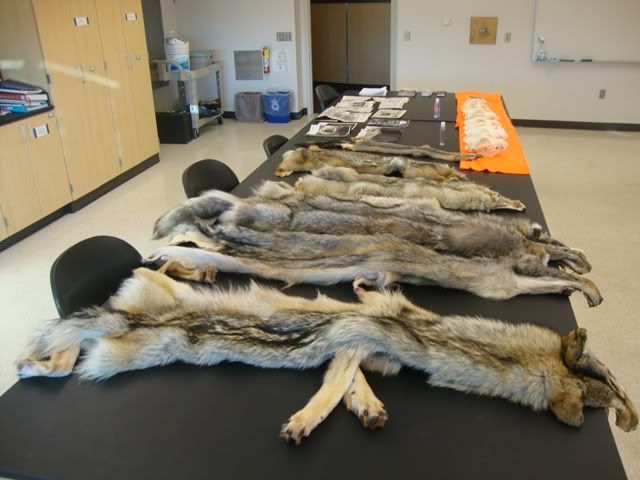
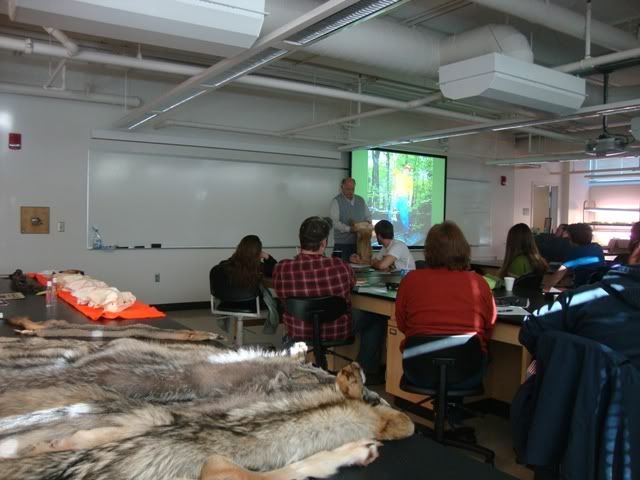
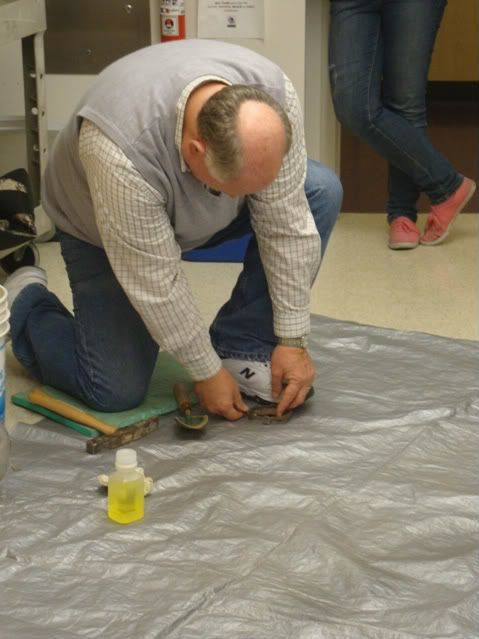
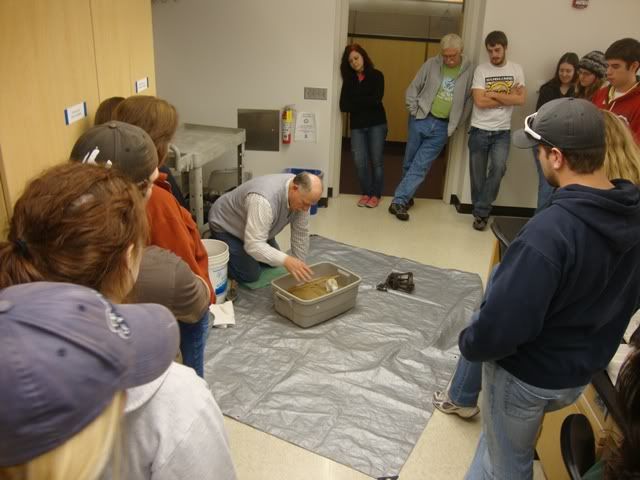
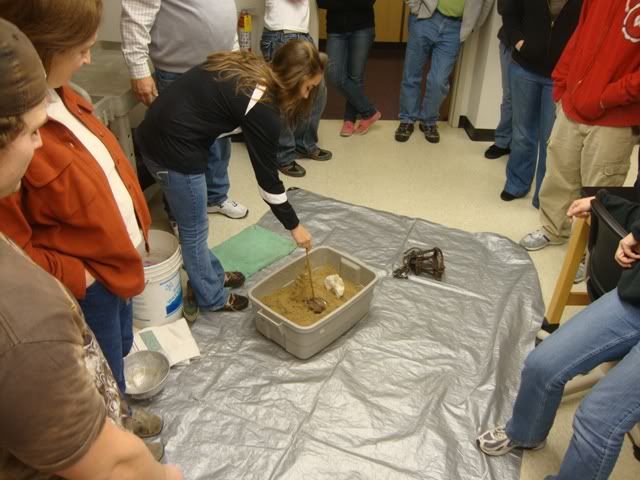
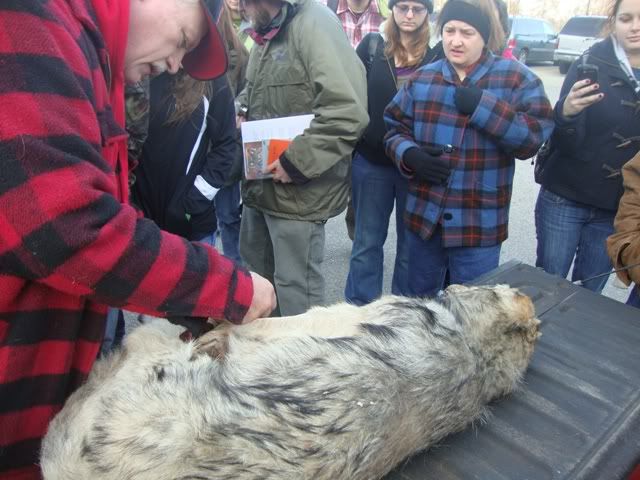
I've read Thoreau and Leopold, but not Jeffers. I'll have to check him out! The workshops look awesome! It's funny you posted this. I was just having a discussion (argument) with a buddy of mine over the wolf and it's reintroduction last night. He is a hunter, and often goes up North to hunt. For some reason he has developed this hatred for wolves even though they have not affected him, or his hunting, directly. He's never even seen one outside of a zoo. Go figure!
ReplyDeleteBill
Hey Bill!
ReplyDeleteDefinitely check out Jeffers. You can find some of his stuff online, I'm sure. Another one of my favs by him is called "Vulture".
Not as many folks hear about him. Even folks who have taken a semester-long environmental literature course. I think this is because such courses have to focus on the big three (Emerson, Thoreau, Leopold)...often times Muir is thrown in...and if there there's time to venture into more modern authors, Edward Abbey always gets his due (and rightfully so). After all of that, there's usually not much time left in a semester for some of the lesser known writers, like Jeffers. Plus, he's pretty heavy(especially his concepts of "Inhumanism"), and I imagine most folks shy away. I suppose some question whether he can actually be considered an "environmental" writer, as his poems cover an array of topics....not just environmental issues.
The workshop was awesome and the class will prove to be awesome this January too!!
It does sound like a cool course!
ReplyDeleteWe once camped in an area where the Wyoming DNR had leg-hold traps out for wolves. I have to admit that the prospect of the traps scared me... especially for our dogs (who ended up staying on leash the entire time). But, it was incredibly cool to see wolves in "our" deserted valley (nobody else was there) and hear them howl at night.
Hi KB!
ReplyDeleteYeah, leg-holds are a tricky thing. Just about anyone who works with larger canines that I've known has told me it's pretty much the only way to catch them (or at least the most effective way). These critters need radio-collars, etc., to be monitored and have their movements tracked. The only way to get a collar on one of these wolves, is to catch them and immobilize them.
But...these traps can be a tricky thing and you always hear about unscrupulous folks using illegal types of traps, or putting them out and abandoning them, which results in by-catch and mortality.
Interestingly, I've heard that once a wolf (or coyote) is caught in a leg-trap...they rarely get caught a second time. Just too smart.
Makes conducting a mark-recapture estimation of the population pretty dang impossible!
Thanks for the heads-up on Jeffers, I'll check it out (big Leopold fan). The wolf course sounds like a great opportunity to get some hands-on experience. The closest I've gotten to a wolf was some fresh scat and tracks in Algonquin Provincial Park, Ontario.
ReplyDeleteD
I'm liking the look of "Ph.D." after your name!
ReplyDeleteCongrats, man!!
My favorite wolf experience involved stepping out of a vehicle in a very remote part of the UP of Michigan...getting set for some bat surveys at night (so it was just about dark)...and hearing TWO wolf packs delineating territorial boundaries on either side of where we parked!
Being out in the middle of nowhere and hearing wolves howl at night....you can't help but have a very visceral response to that!